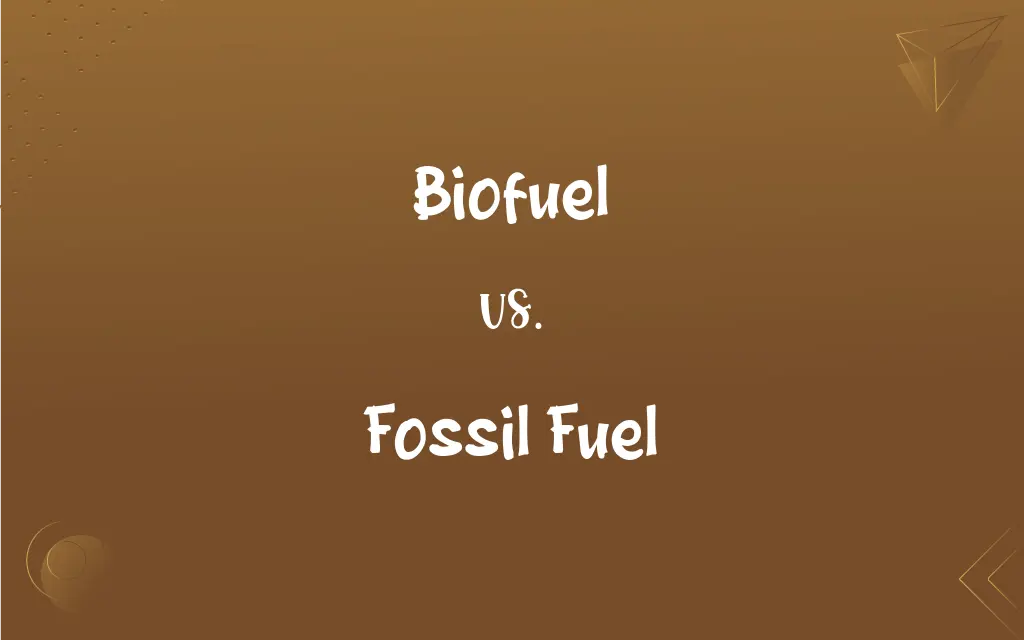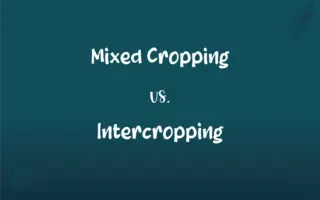Biofuel vs. Fossil Fuel: What's the Difference?
Edited by Aimie Carlson || By Harlon Moss || Updated on October 28, 2023
Biofuel is derived from organic materials, while fossil fuel comes from long-decomposed ancient organisms.

Key Differences
Biofuel is a type of energy source that is produced from organic or biological materials, including plants, algae, and animal waste. Fossil fuel, on the other hand, is derived from the remains of ancient plants and animals buried for millions of years.
The primary advantage of biofuel over fossil fuel is its renewability. Biofuels are made from crops or organic waste, which can be regrown or collected regularly. Fossil fuels, in contrast, are non-renewable, as they require millions of years to form.
When it comes to environmental impact, burning biofuel typically releases fewer harmful emissions than burning fossil fuel. Moreover, the carbon dioxide released by biofuel is often offset by the carbon dioxide absorbed by the plants during their growth. Fossil fuels, however, release carbon that's been sequestered for millions of years, adding to the current carbon cycle.
Production of biofuel can be localized, potentially reducing the geopolitical complexities tied to fossil fuel acquisition. Fossil fuel extraction often necessitates drilling or mining, which can have significant ecological impacts and geopolitical implications.
There are concerns, however, with biofuel taking up land and resources that could be used for food production. Fossil fuels, while abundant now, are finite and will eventually be depleted, emphasizing the need for alternative energy sources like biofuel.
ADVERTISEMENT
Comparison Chart
Source
Organic/biological materials
Ancient remains of plants & animals
Renewability
Renewable (can be regrown/collected)
Non-renewable
Environmental Impact
Typically fewer emissions; carbon-neutral potential
Releases ancient carbon; higher emissions
Production Method
Farming, fermentation, extraction
Drilling, mining
Economic & Geopolitical Role
Can be localized; potential for less geopolitical tension
Often tied to geopolitical complexities and regional monopolies
ADVERTISEMENT
Biofuel and Fossil Fuel Definitions
Biofuel
Biofuel represents renewable sources of energy.
Algae-based biofuel can be harvested regularly, ensuring a sustainable supply.
Fossil Fuel
Fossil fuel is energy derived from ancient organic remains.
Coal, a type of fossil fuel, has been used for centuries for heating and power.
Biofuel
Biofuel is energy derived from organic materials.
Ethanol, a type of biofuel, is often made from corn.
Fossil Fuel
Fossil fuel extraction often requires intensive processes.
Offshore oil drilling is a complex and expensive method to obtain fossil fuel.
Biofuel
Biofuel aims to reduce greenhouse gas emissions.
Switching to biofuel in vehicles can reduce the carbon footprint of transportation.
Fossil Fuel
Fossil fuel has historically been the dominant global energy source.
The Industrial Revolution was powered largely by the fossil fuel coal.
Biofuel
Biofuel can be produced through various biological processes.
Biodiesel, a biofuel, is produced through the transesterification of vegetable oils.
Fossil Fuel
Fossil fuel sources are non-renewable and take millions of years to form.
Once we deplete our petroleum reserves, we can't wait millions of years for more to form.
Biofuel
Biofuel offers an alternative to traditional fossil-based fuels.
Some airlines are testing flights using a blend of conventional jet fuel and biofuel.
Fossil Fuel
Fossil fuel burning is a primary contributor to greenhouse gas emissions.
Combusting coal, a fossil fuel, in power plants releases vast amounts of CO2 into the atmosphere.
Biofuel
A fuel, such as biogas or biodiesel, that is produced from renewable resources, especially plant biomass, vegetable oils, or treated municipal and industrial wastes.
Biofuel
Any fuel that is obtained from a renewable biological resource, especially from biomass.
FAQs
How does the extraction of fossil fuel impact the environment?
Extraction can lead to habitat disruption, pollution, and oil spills.
Why are fossil fuels non-renewable?
Fossil fuels take millions of years to form, making them non-renewable on human timescales.
How does biofuel impact the environment?
Biofuel generally has fewer emissions compared to fossil fuel, with potential for a carbon-neutral cycle.
Are there downsides to using biofuel?
Yes, producing biofuel can divert resources from food production and lead to land use changes.
What are common types of fossil fuel?
Common types include coal, oil, and natural gas.
Why are fossil fuels still dominant?
Infrastructure, established markets, and high energy density make fossil fuels prevalent.
What is biofuel made from?
Biofuel is made from organic materials, such as plants, algae, and animal waste.
How can biofuel support local economies?
Biofuel production can create jobs in agriculture, research, and manufacturing.
What is the economic impact of biofuel?
Biofuel can diversify energy sources, potentially stabilizing prices and reducing geopolitical tensions.
Is biofuel carbon-neutral?
Ideally, the CO2 emitted from burning biofuel is balanced by the CO2 absorbed during its source's growth.
How does fossil fuel contribute to climate change?
Burning fossil fuel releases ancient carbon into the atmosphere, enhancing the greenhouse effect.
How is fossil fuel formed?
Fossil fuel is formed from ancient organic remains subjected to heat and pressure over millions of years.
Is biofuel renewable?
Yes, biofuel is renewable, as its sources can be regrown or collected regularly.
What drives the demand for fossil fuel?
Industrial processes, transportation, heating, and electricity generation.
Can biofuel replace fossil fuel entirely?
While biofuel offers a promising alternative, challenges remain in production scale and energy density.
Are there different types of biofuel?
Yes, including bioethanol, biodiesel, and biogas, among others.
What challenges face the transition from fossil fuel to biofuel?
Issues include production scale, energy density, infrastructure needs, and potential impact on food resources.
How is biofuel produced?
Through methods like fermentation, extraction, and transesterification.
Why is biofuel considered more sustainable?
It's renewable and can reduce greenhouse gas emissions compared to fossil fuel.
Are there clean methods to use fossil fuel?
Some technologies aim to reduce emissions from fossil fuel, like carbon capture and storage.
About Author
Written by
Harlon MossHarlon is a seasoned quality moderator and accomplished content writer for Difference Wiki. An alumnus of the prestigious University of California, he earned his degree in Computer Science. Leveraging his academic background, Harlon brings a meticulous and informed perspective to his work, ensuring content accuracy and excellence.
Edited by
Aimie CarlsonAimie Carlson, holding a master's degree in English literature, is a fervent English language enthusiast. She lends her writing talents to Difference Wiki, a prominent website that specializes in comparisons, offering readers insightful analyses that both captivate and inform.































































